The Chinese Nationalist Party (KMT) yesterday flipped key mayoral seats in Taipei, Taoyuan and Keelung, and won control of 13 out of 22 cities and counties in the nine-in-one local elections.
President Tsai Ing-wen (蔡英文) last night resigned as Democratic Progressive Party (DPP) chairperson over a poor showing by the party’s candidates, who were handpicked by the DPP leadership rather than chosen through primaries.
The Taiwan People’s Party (TPP) won its first high-profile race with Hsinchu mayoral candidate Ann Kao (高虹安) defeating Shen Hui-hung (沈慧虹) of the DPP with 45.02 percent of the vote to Shen’s 35.68 percent.
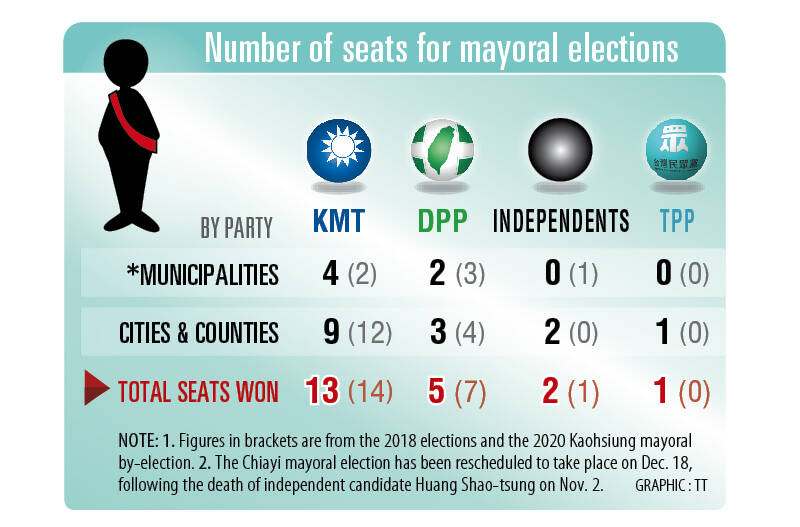
Voters were choosing more than 11,000 local government positions, including the top posts in 21 of the nation’s 22 cities and counties.
The Chiayi mayoral election was postponed to Dec. 18 after a candidate passed away on Nov. 2.
The KMT posted a strong showing.
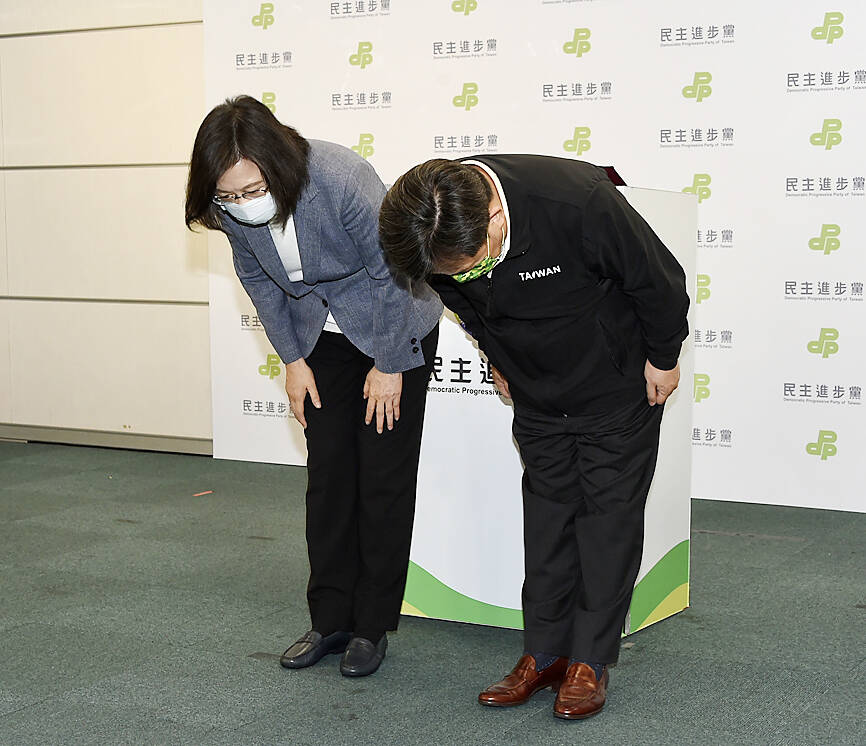
Photo: Ann Wang, Reuters
Although the KMT is to govern only 13 cities and counties, compared with the 14 it currently holds, it is expected to win in Chiayi City next month, while the offices it lost are in smaller constituencies, in Miaoli, Kinmen and Penghu counties.
Its incumbent mayoral candidate in New Taipei City, Hou You-yi (侯友宜), won by a decisive 27.8 percentage points, boosting his chances for a likely run at the presidency in 2024.
KMT Chairman Eric Chu (朱立倫) at party headquarters in Taipei last night declared victory “for Taiwan’s democracy.”
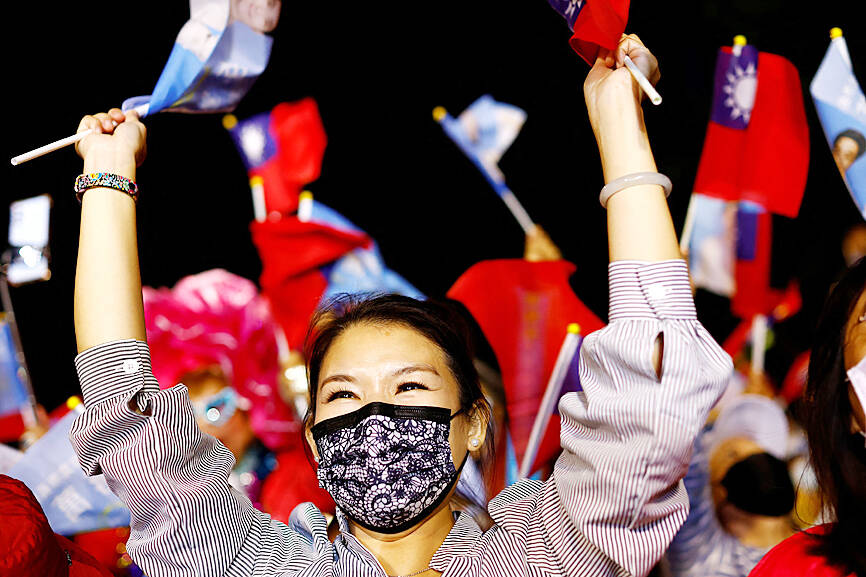
Photo: Carlos Garcia Rawlins, REUTERS
Tsai should “go back to being president,” he said.
“Only through selflessness will the KMT have a chance of winning” in the 2024 presidential election, Chu said.
Speaking at DPP headquarters in Taipei, Tsai said she “humbly accepts” the results, which fell short of expectations.
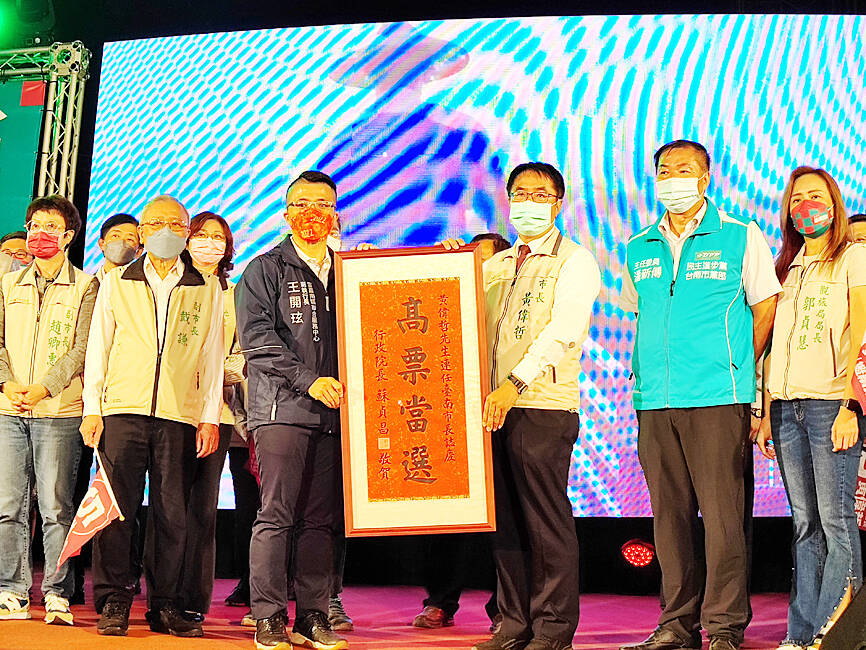
Photo: Wu Chun-feng, Taipei Times
“Although the central government has worked hard, in the face of such results, we have many areas that require deep introspection,” she said.
Tsai also said that Premier Su Tseng-chang (蘇貞昌) had verbally offered to resign, but she did not accept his resignation.
As the ruling party, the DPP cannot stop and despair as challenges could continue to come, but should maintain stability for the sake of the nation, Tsai said.
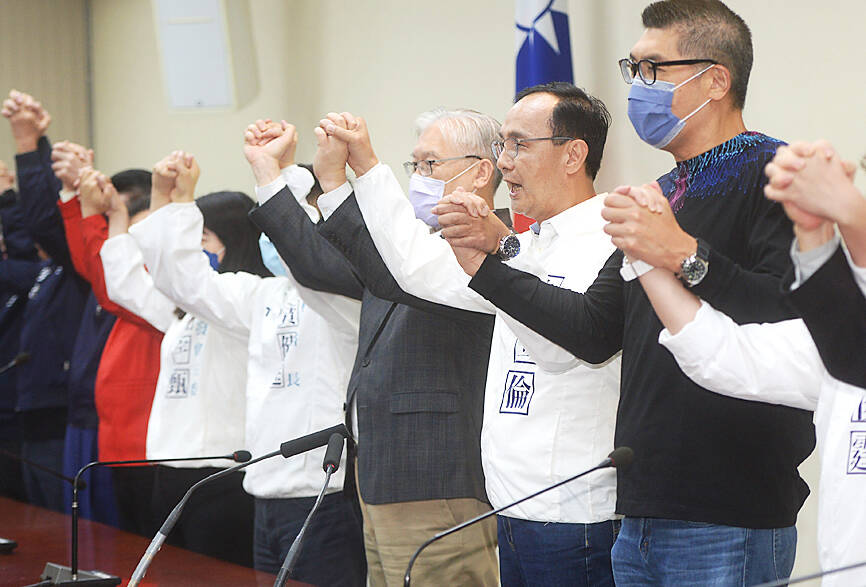
Photo: Lin Cheng-kun, Taipei Times
“We don’t have time to be sad,” she said. “When we fall, we get up again, lift our heads and look to the future.”
The DPP had a tough evening after losing three of the seven cities and counties it currently holds, although it flipped Penghu County to end the day with a total of five municipalities.
It was hoping to improve on its poor performance in the previous nine-in-one elections in 2018, when it secured only six of the top-ticket seats and lost seven to the KMT.
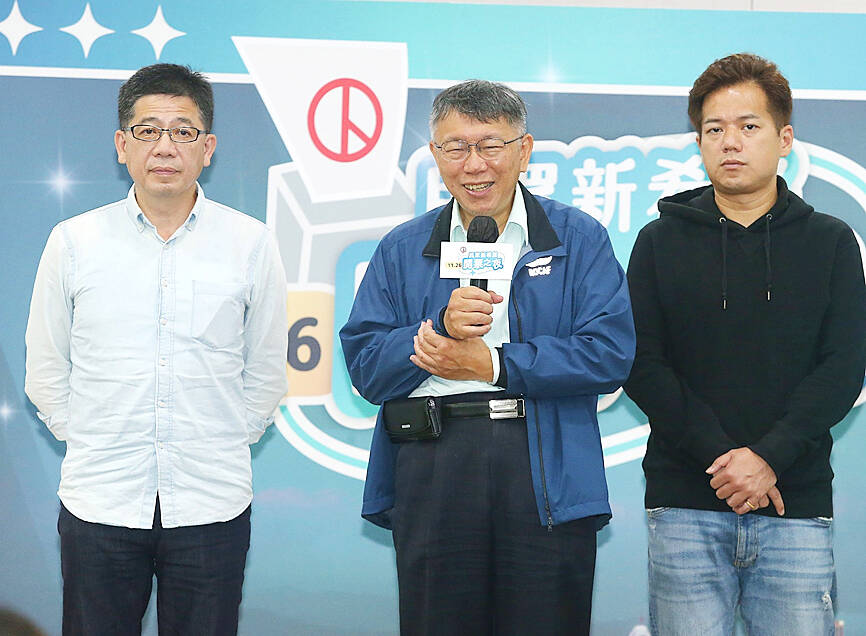
Photo: CNA
While the three DPP incumbents seeking re-election in Kaohsiung, Tainan and Chiayi County retained their positions, the party is to lose the mayoral offices in Taoyuan and Keelung to the KMT, where the outgoing DPP mayors have reached the end of their term limits.
The DPP had high hopes of eking out a victory in Taipei, a traditional KMT stronghold.
However, its candidate — Chen Shih-chung (陳時中), who led the nation’s COVID-19 response as minister of health and welfare for the first two-and-a-half years of the pandemic — trailed Chiang Wan-an (蔣萬安) of the KMT by 10.36 percentage points.
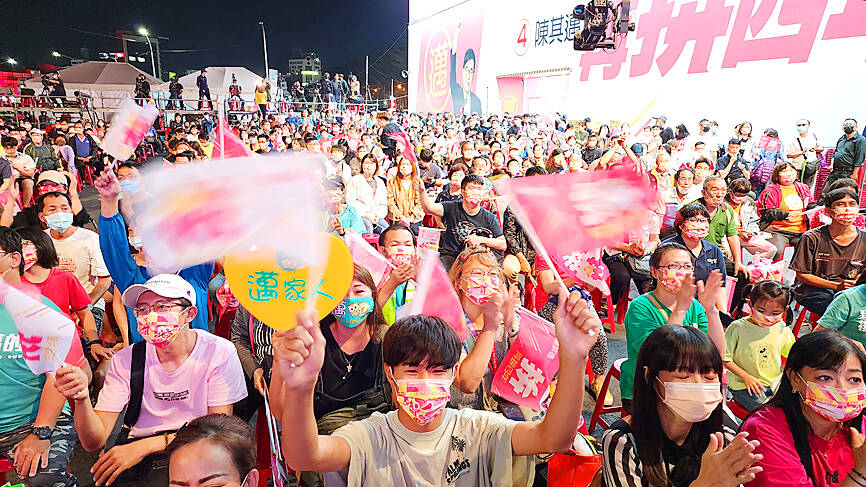
Photo: CNA
The DPP also conceded the Hsinchu mayorship to the TPP, which has been led by an interim mayor since July when former DPP mayor Lin Chih-chien (林智堅) stepped down to run for Taoyuan mayor.
The race in Tainan was tighter than anticipated, with incumbent DPP Mayor Huang Wei-che (黃偉哲) only winning by 5.17 percentage points over KMT candidate Hsieh Lung-chieh (謝龍介).
A double-digit percantage margin was expected.
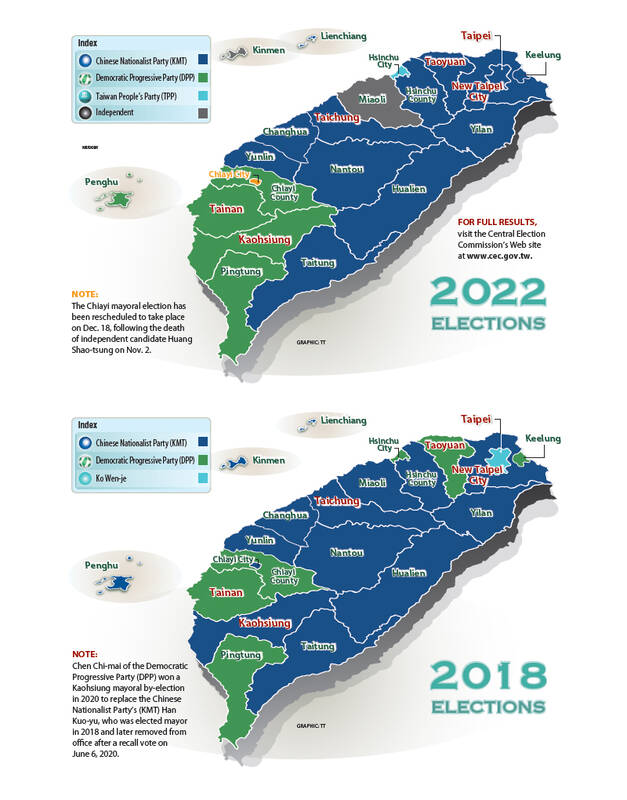
Kaohsiung Mayor Chen Chi-mai (陳其邁) of the DPP won re-election decisively with a margin of 17.94 percentage points over KMT candidate Ko Chih-en (柯志恩).
The TPP — which for the first time participated in the local elections after Taipei Mayor Ko Wen-je (柯文哲) founded the party in 2019 — celebrated Kao’s victory in Hsinchu after a contentious campaign.
Although she did not win, independent Taipei mayoral candidate Vivian Huang (黃珊珊), who was backed by the TPP, drew 25.14 percent of the vote.
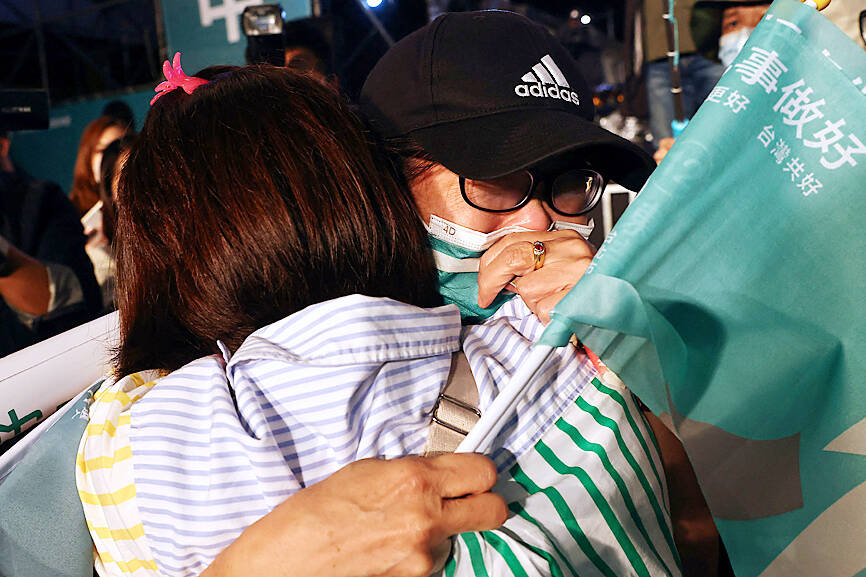
Photo: Ann Wang, REUTERS
Although Kao was smeared during the campaign, she became “more courageous along the way” to victory in Hsinchu, Ko told reporters last night.
This election has taught the TPP that it must revere the public’s opinion, he said, adding that wins by 14 city and county counselors and close losses by eight show that there is “still a ways to go” for its candidates.
“The people hope for a new force in politics,” he said, adding that the party would continue to work hard after a it reorganizes itself.
Asked whether he would run for president in 2024, Ko said that he has already received a request from National Taiwan University to report back to his former job on Dec. 25.

SECURITY: As China is ‘reshaping’ Hong Kong’s population, Taiwan must raise the eligibility threshold for applications from Hong Kongers, Chiu Chui-cheng said When Hong Kong and Macau citizens apply for residency in Taiwan, it would be under a new category that includes a “national security observation period,” Mainland Affairs Council (MAC) Minister Chiu Chui-cheng (邱垂正) said yesterday. President William Lai (賴清德) on March 13 announced 17 strategies to counter China’s aggression toward Taiwan, including incorporating national security considerations into the review process for residency applications from Hong Kong and Macau citizens. The situation in Hong Kong is constantly changing, Chiu said to media yesterday on the sidelines of the Taipei Technology Run hosted by the Taipei Neihu Technology Park Development Association. With

CARROT AND STICK: While unrelenting in its military threats, China attracted nearly 40,000 Taiwanese to over 400 business events last year Nearly 40,000 Taiwanese last year joined industry events in China, such as conferences and trade fairs, supported by the Chinese government, a study showed yesterday, as Beijing ramps up a charm offensive toward Taipei alongside military pressure. China has long taken a carrot-and-stick approach to Taiwan, threatening it with the prospect of military action while reaching out to those it believes are amenable to Beijing’s point of view. Taiwanese security officials are wary of what they see as Beijing’s influence campaigns to sway public opinion after Taipei and Beijing gradually resumed travel links halted by the COVID-19 pandemic, but the scale of

A US Marine Corps regiment equipped with Naval Strike Missiles (NSM) is set to participate in the upcoming Balikatan 25 exercise in the Luzon Strait, marking the system’s first-ever deployment in the Philippines. US and Philippine officials have separately confirmed that the Navy Marine Expeditionary Ship Interdiction System (NMESIS) — the mobile launch platform for the Naval Strike Missile — would take part in the joint exercise. The missiles are being deployed to “a strategic first island chain chokepoint” in the waters between Taiwan proper and the Philippines, US-based Naval News reported. “The Luzon Strait and Bashi Channel represent a critical access

Pope Francis is be laid to rest on Saturday after lying in state for three days in St Peter’s Basilica, where the faithful are expected to flock to pay their respects to history’s first Latin American pontiff. The cardinals met yesterday in the Vatican’s synod hall to chart the next steps before a conclave begins to choose Francis’ successor, as condolences poured in from around the world. According to current norms, the conclave must begin between May 5 and 10. The cardinals set the funeral for Saturday at 10am in St Peter’s Square, to be celebrated by the dean of the College